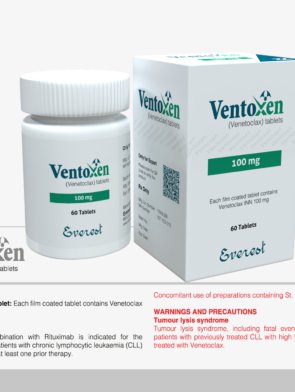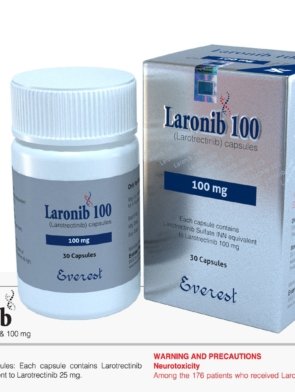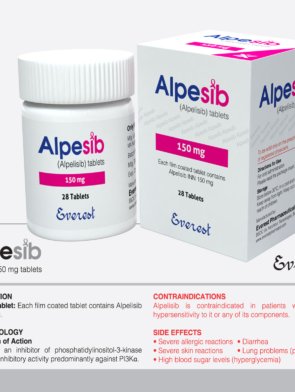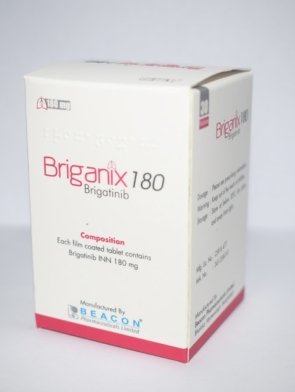Hernix (Neratinib) 40 mg
£0.00
Hernix (neratinib) is an oral medication that works as a permanent blocker of tyrosine kinase. It stands as the singularly approved solution globally for aggressive post-treatment care following HER2-positive breast cancer treatment with trastuzumab (Herceptin). Its purpose is to diminish the likelihood of cancer recurrence specifically for patients who have completed the standard trastuzumab adjuvant therapy but still possess elevated risk factors for disease resurgence.
Indications of Hernix 40 mg
Extended Adjuvant Treatment of Early-Stage Breast Cancer: Hernix 40 mg is recommended as a standalone therapy for prolonging treatment in adults diagnosed with early-stage HER2-positive breast cancer. This follows adjuvant therapy with Trastuzumab.
Advanced or Metastatic Breast Cancer: Hernix 40 mg, when combined with Capecitabine, is indicated for treating adult patients with advanced or metastatic HER2-positive breast cancer who have previously undergone two or more anti-HER2 based regimens in the metastatic setting.
Therapeutic Class
Hernix 40 mg falls under the category of Tyrosine Kinase Inhibitors.
Pharmacology
Hernix 40 mg is an irreversible kinase inhibitor that binds to Epidermal Growth Factor Receptor (EGFR), Human Epidermal Growth Factor Receptor 2 (HER2), and HER4. In laboratory studies, it has shown to reduce autophosphorylation of EGFR and HER2, inhibit downstream MAPK and AKT signaling pathways, and exhibit antitumor activity in carcinoma cell lines expressing EGFR and/or HER2. Hernix 40 mg metabolites M3, M6, M7, and M11 have demonstrated inhibitory effects on EGFR, HER2, and HER4 activity in vitro. In animal studies, oral administration of Hernix 40 mg has inhibited tumor growth in mouse models with HER2 and EGFR-expressing tumor cell lines.
Dosage & Administration of Hernix 40 mg
For antidiarrheal prophylaxis, initiate loperamide concurrently with the first dose of Hernix 40 mg and continue for the first two cycles (56 days) of treatment. Patients should aim for 1-2 bowel movements per day, and they should be educated on antidiarrheal treatment protocols.
The recommended dosage of Hernix 40 mg is 240 mg (6 tablets) taken orally once daily with food continuously for one year. Dose adjustments, including interruptions or reductions, should be made based on individual safety and tolerability. Patients with severe hepatic impairment should start with a reduced dose of 80 mg.
Interaction of Hernix 40 mg
Avoid concomitant use of Hernix 40 mg with gastric acid-reducing agents such as proton pump inhibitors (PPI) and H2-receptor antagonists. Use caution when administering with strong or moderate CYP3A4 inhibitors or inducers, as well as with P-glycoprotein (P-gp) substrates.
Contraindications
Hernix 40 mg is contraindicated in individuals with known hypersensitivity to the medication or any of its components.
Side Effects of Hernix 40 mg
Common side effects include diarrhea and hepatotoxicity.
Pregnancy & Lactation
There is limited data on the use of Hernix 40 mg in pregnant women or its effects on breastfeeding infants. Women of childbearing age should undergo pregnancy testing before starting treatment and should use effective contraception during treatment and for at least one month after the last dose. Lactating women are advised not to breastfeed while taking Hernix 40 mg and for at least one month after treatment discontinuation.
Precautions & Warnings
Patients experiencing diarrhea despite prophylaxis should receive additional antidiarrheals and fluid/electrolyte replacement as needed. Hernix 40 mg should be withheld in cases of severe or persistent diarrhea and permanently discontinued in cases of Grade 4 diarrhea or Grade ≥ 2 diarrhea following maximal dose reduction. Liver function should be monitored regularly during treatment, with dose adjustments made as necessary. Patients should be informed of the potential fetal harm associated with Hernix 40 mg and advised to use effective contraception during treatment.
Overdose Effects of Hernix 40 mg
There is no specific antidote for Hernix 40 mg overdose, and management should focus on supportive measures. In clinical trials, overdose symptoms included diarrhea, nausea, vomiting, and dehydration.
Storage Conditions
Hernix 40 mg should be stored below 30°C in a cool, dry place away from sunlight and out of reach of children.
Use In Special Populations
The safety and efficacy of Hernix 40 mg in pediatric patients have not been established. Geriatric patients may experience an increased incidence of serious adverse reactions, and dose adjustments may be necessary for those with severe hepatic impairment.
Mode Of Action
Hernix 40 mg irreversibly binds to EGFR, HER2, and HER4, inhibiting their activity. It has demonstrated antitumor effects in vitro and in vivo, primarily through inhibition of downstream signaling pathways. Hernix 40 mg is metabolized primarily in the liver and excreted predominantly through feces.
Pregnancy
Hernix 40 mg can cause fetal harm, and pregnant women should be informed of the potential risks. Effective contraception should be used during treatment and for at least one month after the last dose. Lactating women should refrain from breastfeeding while taking Hernix 40 mg and for at least one month after treatment completion.
Pediatric Uses
The safety and efficacy of Hernix 40 mg in pediatric patients have not been established. Geriatric patients may require dose adjustments based on hepatic function.
| Product Name | Hernix |
|---|---|
| Generic Name | Neratinib |
| Formulation | Tablet |
| Available Pack size | 180 tablets |
| Strengths | 40 mg |
You must be logged in to post a review.





Reviews
There are no reviews yet.